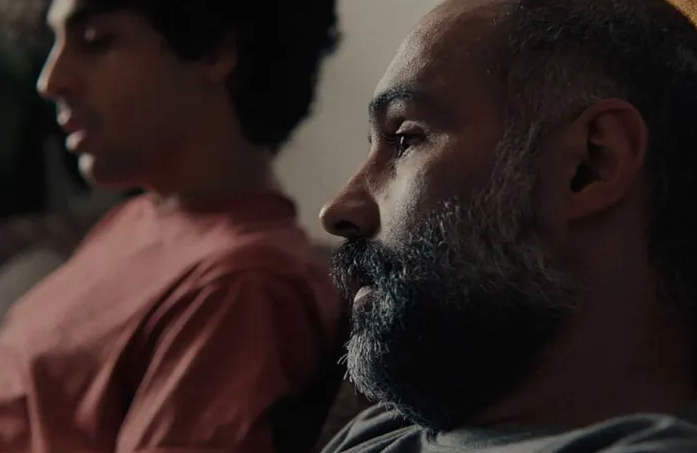|
Maziyar Khatam and Amir Zavosh in “Baba” (2023) Filmmakers Anya Chirkova and Maziyar Khatam are two of the most exciting emerging talents in the industry. From writer-director Chirkova’s summer romance “Flower Boy” (which starred Khatam), to Khatam’s clever Sundance short film “Bump” (which he directed, wrote, and starred in), these 2021 works exemplify clear artistic voices. Through relatable characters and impactful gestures, they tell stories of everyday life. “Flower Boy,” filmed in a dreamy summer haze, captures the hopes and dreams of a teenager figuring out who he is. “Bump,” in broad daylight of a city sidewalk, finds physical humor in the trivial altercation of getting accidentally bumped into. These films are the epitome of short and sweet, which has come to define what one can expect from Chirkova and Khatam. Their new collaboration is a short film called “Baba,” which screened at Sundance earlier this year.
Co-directed by Chirkova and Meran Ismailsoy, “Baba” follows a middle-aged Iranian man (Amir Zavosh) as he desperately tries to keep his apartment. All the while, his relationship with his son (Maziyar Khatam) is unraveling in real time. From the moment these characters are introduced, the parental tension is palpable. The father, behind on his rent, is dodging his son’s attempts at conversation. Not to mention pleas from the landlord (James Choy) as well as an upset neighbor complaining about the noise. The film excels at placing you in the thick of a claustrophobic environment, both on an emotional level and by way of setting. A narrow apartment traps chaotic conversations in its walls. Each character who steps foot in this space is immediately caught up in the chaos. The flow of dialogue and use of setting create an echo chamber, which is a strong reflection of the film’s protagonist — he exists in an environment where he engages only with opinions that reinforce his own. Whether it’s his son or his landlord, no one can really get through to him. “Baba” holds attention on a father’s fall from grace, doing so with such a visceral approach that you feel present not only in the apartment, but in his frame of mind. Maziyar Khatam’s screenplay evokes a human experience in a way that feels effortless. The dialogue shines a light on the hurdles of communication barriers and the heartache of isolating from one’s surroundings. Amir Zavosh’s character is so deeply wrapped up in his personal scenarios, everyone else who steps foot into the apartment at some point becomes background noise to his centrality as a protagonist. It is also through the supporting characters that you get a glimpse into the protagonist’s relationships, such as that with his son. Amir Zavosh and Maziyar Khatam, who share wonderful chemistry with each other, bring a grounded quality to the story. You feel immediately drawn to the realism of their characters as they navigate one anxiety-ridden scenario after another. In feeling like a fly on the wall of their experiences, Zavosh’s character especially, the ending is made all the more reverberating as a stunning moment of self-reflection. From the frenetic handheld camera work and overlapping tense dialogue to the claustrophobic setting, “Baba” unfolds mostly in a state of disorder. The direction by Chirkova and Ismailsoy finds strength in beginning the story at a place where tension has already risen and you find yourself in the thick of it. Given the tensity, it is an unexpected surprise how “Baba” ends with such peacefulness. The film’s strong use of a close-up stresses a poignant moment for the protagonist; it’s a well-earned window to his emotional vulnerability, which Zavosh plays very well. Aligned with the direction and screenplay, the acting showcases strong commitment to making a day-in-the-life story feel as realistic as possible.
0 Comments
Leave a Reply. |
Archives
June 2024
Categories |


 RSS Feed
RSS Feed